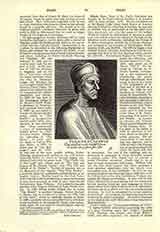

Colet, JOHN, Dean of St. Paul’s Cathedral and founder of St. Paul’s School, London; b. in London, 1467; d. there September 18, 1519. He was the eldest son of Sir Henry Colet, twice Lord Mayor of London. Having finished his schooling in London, he was sent to Oxford, but no particulars of his life there have been preserved, not even the name of his college. While at Oxford he determined to become a priest and even before ordination obtained through family influence much preferment, including the livings of St. Mary Dennington, Suffolk, St. Dunstan, Stepney, and benefices in the counties of Huntingdon, Northampton, York, and Norfolk. In 1493 he began a tour through France and Italy, studying as he went and acquiring that love of the new learning which markedhis after-life. Returning to England in 1496, he prepared for ordination, andbecame deacon on December 17, 1497, and priest on March 25, 1497-8. He lectured at Oxford on St. Paul’s Epistles, introducing a new treatment by abandoning the purely textual commentary then usual, in favor of a study of the personality of St. Paul and of the text as a whole. In 1498 he met Erasmus at Oxford, with whom he immediately became intimate, arousing in him especially a distrust of the later schoolmen. Colet’slectures on the New Testament continued for five years, until in 1504 he wasmade Dean of St. Paul’s, proceeding D.D. before he left Oxford. In Londonhe became the intimate friend and spiritual adviser of Sir Thomas More. At the death of his father in 1505 he inherited a fortune, which he devoted to public purposes. His administration of the cathedral was vigorous, and in 1509 he began the foundation of the great school with which his name will ever be associated. The cost of the buildings and endowments is estimated at forty thousand pounds in present value. The object was to provide a sound Christian education. Greek was to be at least of equal importance with Latin. William Lilly was the first head master, but Colet exercised a close personal supervision over the school, even composing some of the textbooks. In 1512 he was accused of advanced views and was in difficulties with his bishop, but on the trial Archbishop Warham dismissed the charges as frivolous. It may well be that Colet, irritated by obvious abuses and not seeing how far the reaction would go, used language on certain points which in the light of after-events is regrettable. but there can be no doubt as to his own orthodoxy and devotion. In 1518 he completed the revised statutes of his school. At his death the following year he was buried in St. Paul’s Cathedral. His school remained on its original site until 1884, when it was removed to Hammersmith.
Colet’s works are: “Convocation Sermon of 1512”; “A righte fruitfull admonition concerning the order of a good Christian man’s life” (1534); “Joannis Coleti Theologi olim Decani Divi Pauli . Editio” (1527, and often reprinted), the original of almost all Latin Grammars of the sixteenth and seventeenth centuries; “Opus de Sacramentis Ecclesiae” (1867), which with the following treatises, long preserved in MS., was finally edited by the Rev. J. H. Lupton, sur-master of the school; two treatises on the “Hierarchies” of Dionysius (1869); “An Exposition of St. Paul’s Epistle to the Romans” (1873); “An Exposition of St. Paul’s first Epistle to the Corinthians” (1874); “Letters to Radulphus” on the Mosaic account of the Creation, and some minor works (1876); “Statutes of St. Paul’s School” (often reprinted). Pitts (de Ang. Scriptoribus, Paris, 1619) gives several additional works by Colet, none of which are extant. Many of his letters are in the works of Erasmus.
EDMIN BURTON

